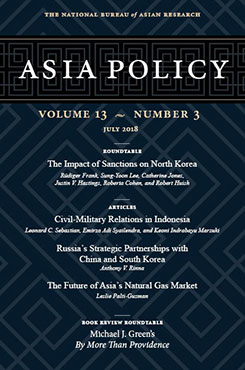Russia's Strategic Partnerships with China and South Korea
The Impact of THAAD
This article analyzes the effects of the Terminal High Altitude Area Defense (THAAD) missile defense system on Russia’s strategic partnerships with China and South Korea.
EXECUTIVE SUMMARY
MAIN ARGUMENT
Russia opposes THAAD’s placement in South Korea and has begun to cooperate with China on missile defense. But despite this cooperation, THAAD’s effects on Russia’s relations with South Korea have been limited compared with China’s. Whereas Beijing retaliated economically, Moscow remains keen to develop closer trade ties with Seoul. The pursuit of strategic partnerships with China and South Korea has encouraged Moscow to maintain balanced relations with both countries even while facing a mutually contentious issue.
POLICY IMPLICATIONS
- Because the Sino-Russian relationship is a strategic partnership as opposed to a full-fledged alliance, Moscow is able to cooperate with Beijing on issues of mutual interest without being in complete lockstep.
- South Korea’s policies toward Russia, more so than Japan’s policies, have diverged from those of the United States in crucial respects. As a result, Russia tends to view its relationship with Japan through the lens of the U.S.-Japan alliance, whereas it has a more independent relationship with South Korea.
- Given that South Korea is a particularly important player in Russia’s bid to develop its Far Eastern region, Moscow is unlikely to allow THAAD to derail its growing economic relationship with Seoul.
About Asia Policy
Asia Policy is a peer-reviewed scholarly journal presenting policy-relevant academic research on the Asia-Pacific that draws clear and concise conclusions useful to today’s policymakers. Asia Policy is published quarterly in January, April, July, and October and accepts submissions on a rolling basis. Learn more


